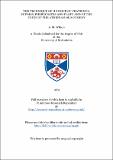Files in this item
The technique of humour of Cratrinus, Eupolis, Pherecrates and Plato and of the poets of the Athenian old comedy
Item metadata
| dc.contributor.advisor | Dover, Kenneth James | |
| dc.contributor.author | Wilson, Allan Murray | |
| dc.coverage.spatial | xix, 364 p. | en_US |
| dc.date.accessioned | 2018-07-16T15:09:52Z | |
| dc.date.available | 2018-07-16T15:09:52Z | |
| dc.date.issued | 1974 | |
| dc.identifier.uri | https://hdl.handle.net/10023/15438 | |
| dc.description.abstract | The thesis examines the technique of humour of the old comedians other than Aristophanes, concentrating particularly upon the four for whom we have the best evidence, viz. Cratinus, Eupolis, Pherecrates and Plato. The internal and external evidence for the kind of humour they employed is considered under five principal groupings, viz. The Visual Elements, Ridicule and Criticism, Physical Humour, Parody and Borrowings, and Imagery, Vocabulary and Verbal Devices. Within these main groupings there are many sub-divisions under which the examples of particular techniques are collected and discussed. A list of references is normally given, unless the discussion itself has already listed all examples. Several longer fragments are given detailed consideration and there is an index of fragments discussed. Account is taken of the most recently discovered fragments published in Oxyrhynchus Papyri. Many conclusions relate to limited techniques or even to particular fragments, but in broad terms we can see that Cratinus plays' had varied political, literary, philosophical and social themes and that some of his burlesques were allegories. Criticism and invective were strongly represented, there was some obscenity, parody tended to be of homer and the early poets rather than of Fifth Century Tragedy, and verbal inventiveness and word-play were prominent. Cratinus had much to say of his rivals and himself. Eupolis overriding interest was in topical criticism and he had no taste for fantasy and mythological burlesque. He shows no signs of full-scale criticism of Tragedy, but some interest in lyric poetry and in philosophy is apparent. He exploited sexual and excretory humour, but was less given to coining words than Crantius. Pherecrates avoided political criticism on the scale of Cratinus and Eupolis attacks and composed rather plays of everyday life. Dietary humour and the Golden Age these are well attested in his work, but he used obscenity with some restraint. He shows but a listed interest in parody. Plato wrote both in the Old and Middle Comedy style, composing burlesques, political plays and literary comedies. Burlesques with erotic themes were particularly to his liking (of. Aleseus Comicus), and sexual humour was probably an important part of his technique. Plato was capable in his use of imagery and verbal humour. Strattis provides our best evidence for burlescue of Tragedy on a large scale. | en_US |
| dc.language.iso | en | en_US |
| dc.subject.lcc | PA3170.W5 | en |
| dc.subject.lcsh | Greek drama (Comedy) | en |
| dc.title | The technique of humour of Cratrinus, Eupolis, Pherecrates and Plato and of the poets of the Athenian old comedy | en_US |
| dc.type | Thesis | en_US |
| dc.type.qualificationlevel | Doctoral | en_US |
| dc.type.qualificationname | PhD Doctor of Philosophy | en_US |
| dc.publisher.institution | The University of St Andrews | en_US |
This item appears in the following Collection(s)
Items in the St Andrews Research Repository are protected by copyright, with all rights reserved, unless otherwise indicated.

